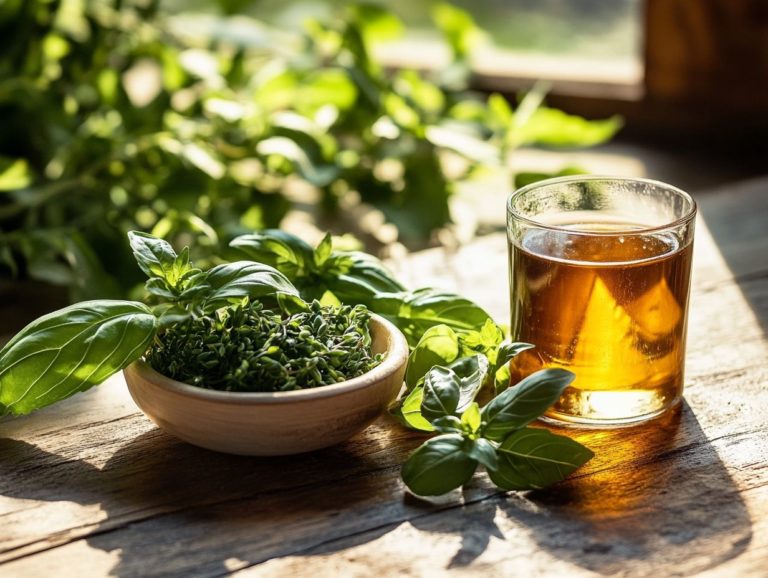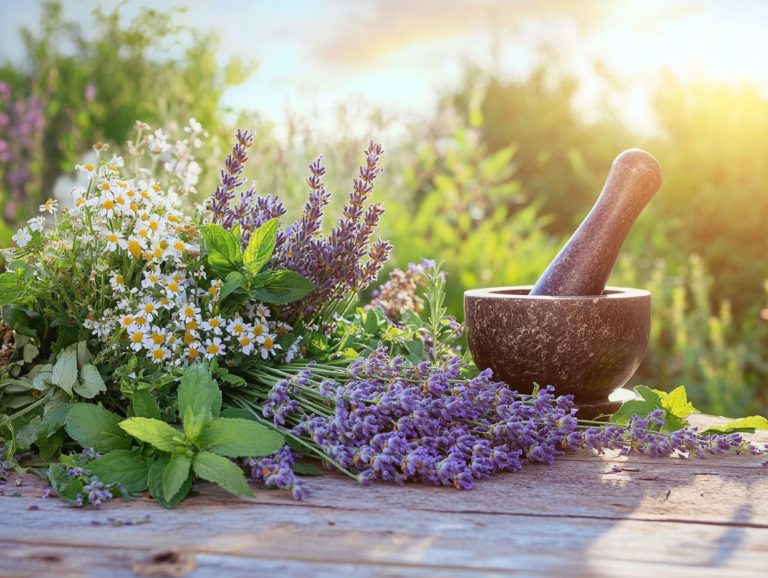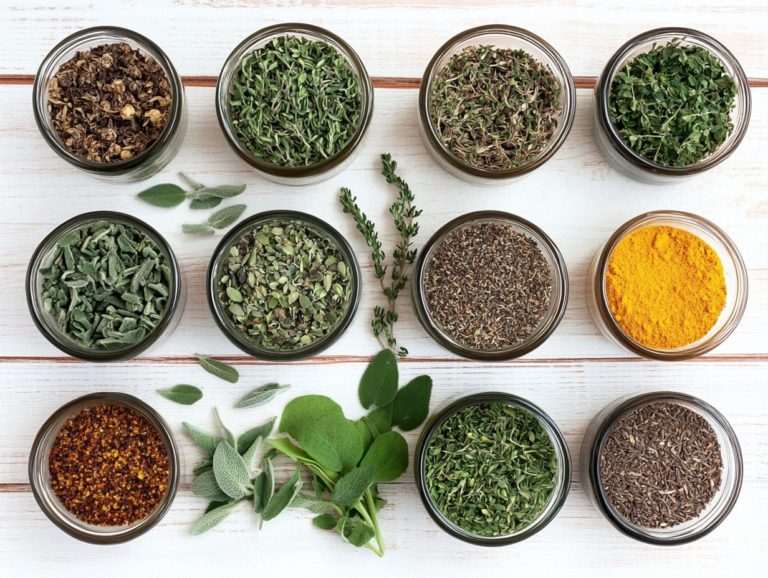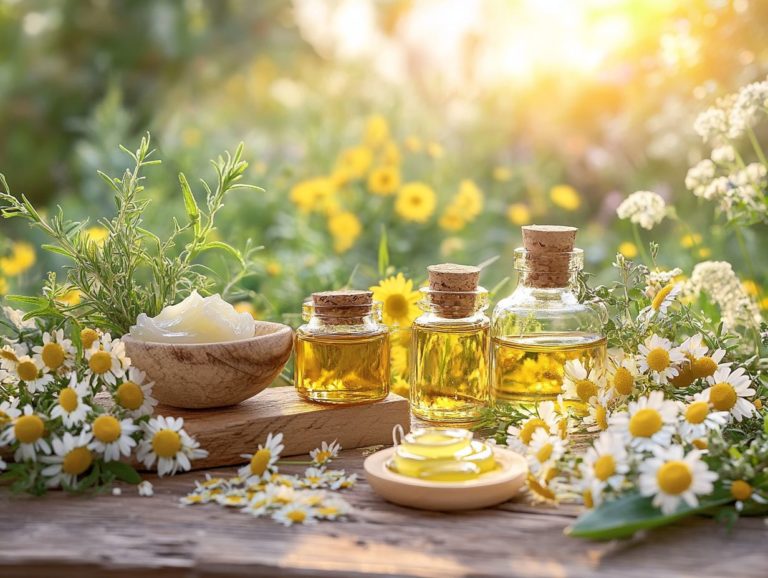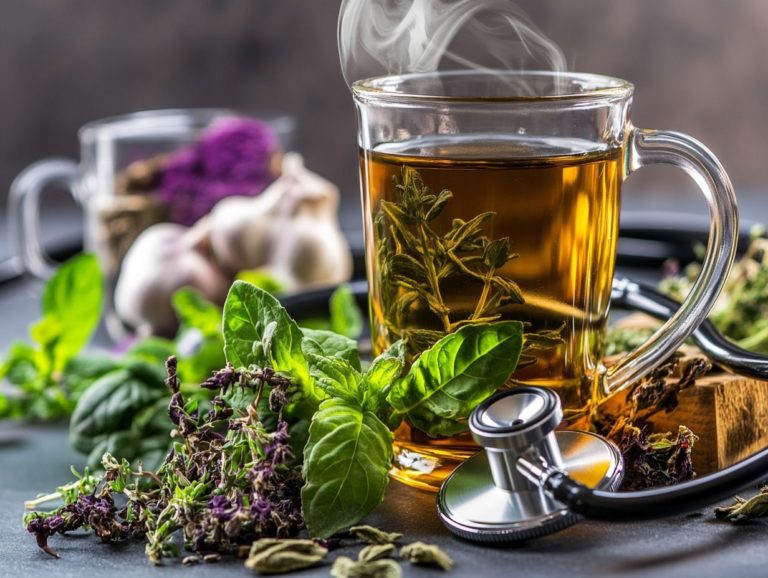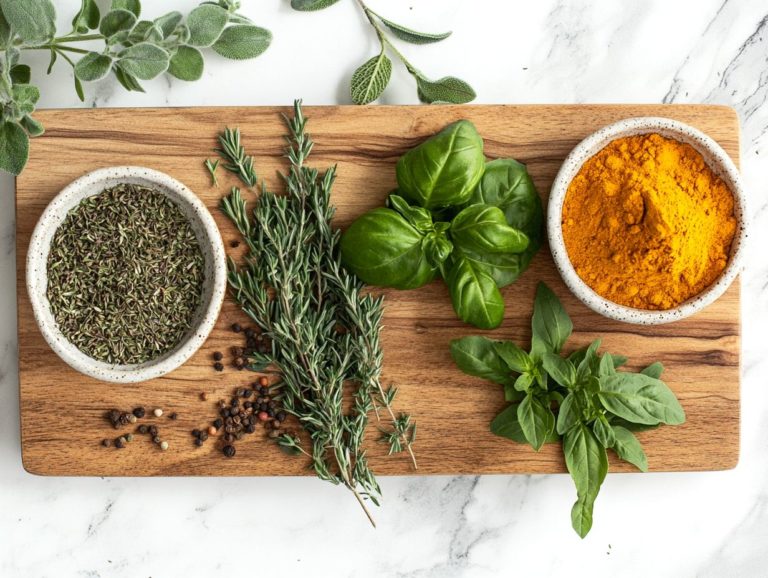Herbs That Help with Skin Irritations
Skin irritations are frustrating and uncomfortable. They can arise from allergies, environmental factors, or underlying conditions.
While you might be tempted to reach for over-the-counter remedies, consider that nature offers a wealth of herbal solutions designed to soothe and heal irritated skin.
This article delves into the common causes and symptoms of skin irritations. It emphasizes the benefits of herbal remedies and introduces you to the top herbs for effective treatment.
It also covers application methods, necessary precautions, and guidance on when to consult a professional.
Discover how you can harness nature’s power for healthier, glowing skin today!
Contents
- Key Takeaways:
- Understanding Skin Irritations
- The Benefits of Using Herbs for Skin Irritations
- Top Herbs for Treating Skin Irritations
- How to Use Herbs for Skin Irritations
- Precautions and Potential Side Effects
- Frequently Asked Questions
- Explore Herbal Remedies
- What are some common herbs that can help with skin irritations?
- How do these herbs help with skin irritations?
- How can I use these herbs to treat skin irritations?
- Are these herbs safe to use on all skin types, including sensitive skin types?
- Can these herbs be used to treat specific skin conditions, such as eczema and dermatitis?
- Are there any side effects or precautions when using these herbs for skin irritations or topical applications?
Key Takeaways:
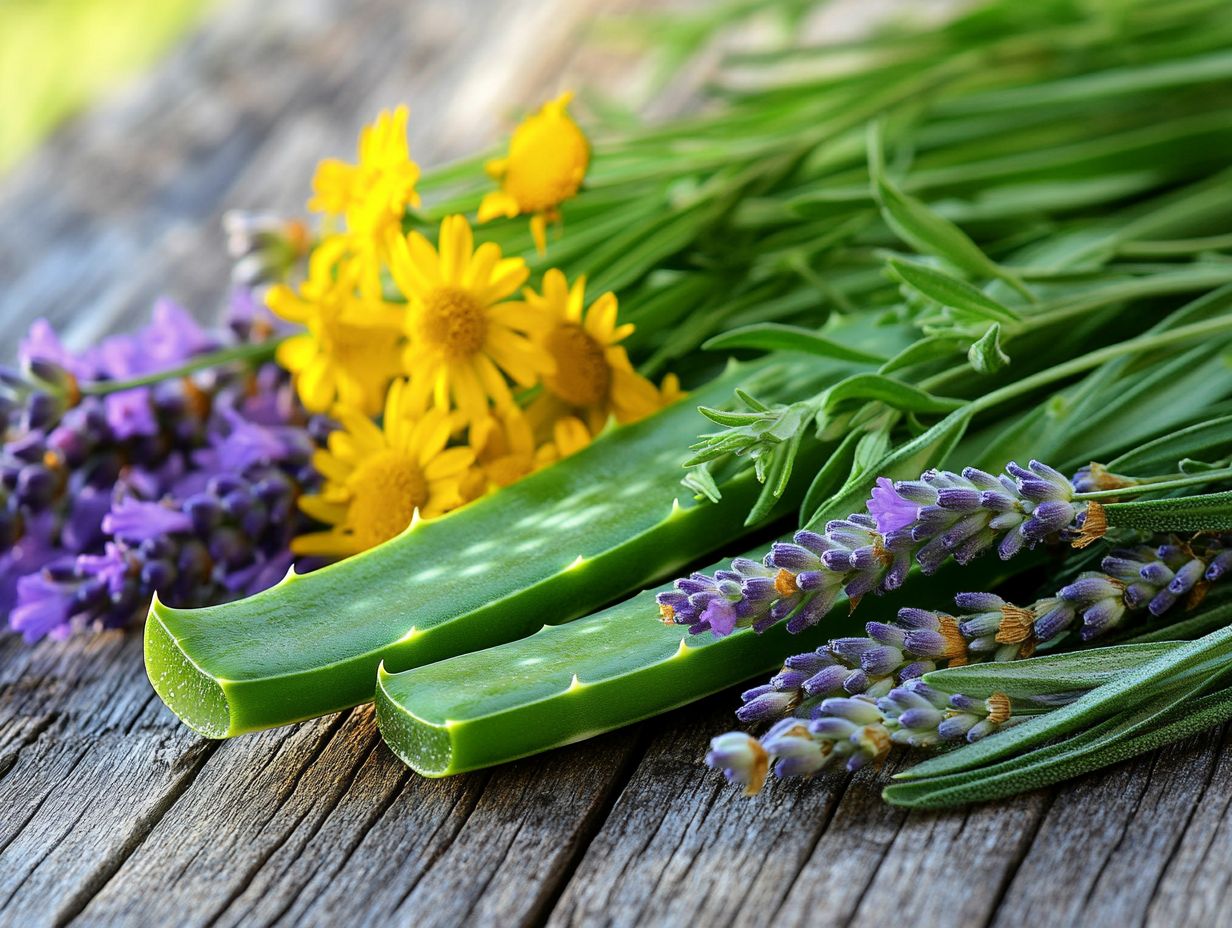
- Herbs can treat skin irritations naturally and effectively, avoiding potential side effects.
- Chamomile, aloe vera, and lavender soothe and heal skin irritation.
- Consult a doctor if irritation persists or worsens; it may indicate a serious condition.
Understanding Skin Irritations
Understanding skin irritations means recognizing how various environmental elements and internal factors contribute to conditions like eczema (a skin condition that causes redness and itching) and dermatitis (inflammation of the skin).
Common culprits include allergies and irritants. Stress factors can also weaken your skin barrier, leading to inflammation and discomfort.
Common Causes and Symptoms
Common culprits of skin irritations include allergens, irritants like specific soaps, and environmental factors such as pollution. These can lead to unwelcome symptoms like eczema, dermatitis, redness, and acne breakouts.
Recognizing these sources is essential for maintaining your skin’s health. Allergens, such as pollen or pet dander, can trigger allergic reactions, resulting in itchy patches and hives.
Irritants often lurking in harsh cleaners or perfumes can disrupt your skin barrier, leading to dryness and inflammation. Environmental factors like pollution contribute to stress on your skin, worsening conditions such as acne and leaving it looking dull.
Identifying these triggers early on is crucial. By doing so, you can implement effective treatment strategies that ensure your skin stays healthy and resilient against future irritations.
The Benefits of Using Herbs for Skin Irritations
Using herbs for skin irritations offers remarkable natural remedies. They soothe and heal effectively. For instance, aloe vera and chamomile are celebrated for their anti-inflammatory and calming effects, providing you with a botanical alternative to conventional treatments.
Natural Remedies vs. Over-the-Counter Options
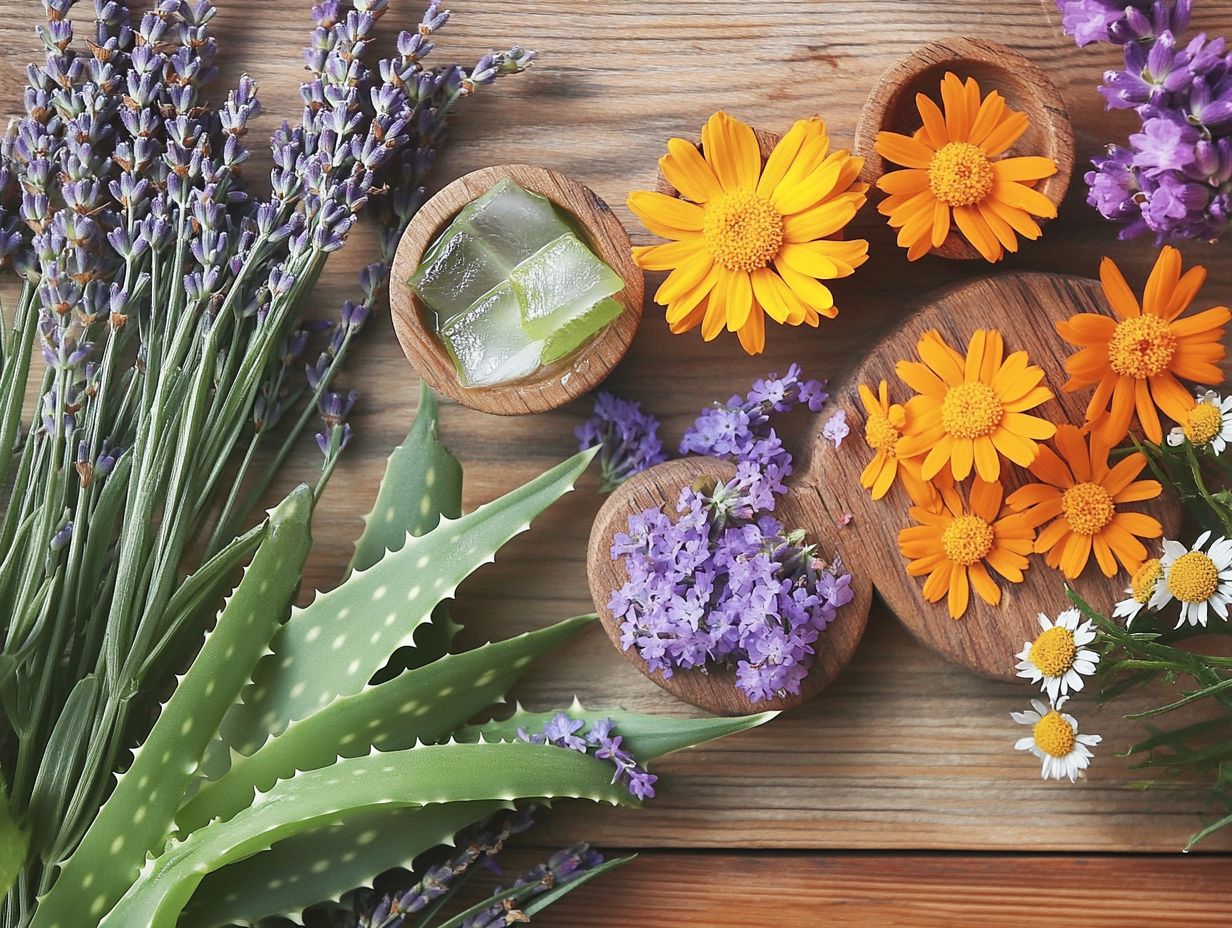
When considering treatment for skin irritations, you may weigh the benefits of natural remedies against over-the-counter options. Herbal solutions often provide effective anti-inflammatory and soothing effects that can be appealing.
Take aloe vera and chamomile, for example. These ingredients are celebrated for their calming properties and serve as excellent alternatives to conventional creams, which may contain harsh chemicals and potential allergens. For those seeking natural solutions, DIY herbal treatments for skin irritations can be effective. While over-the-counter products promise quick relief, they sometimes come with side effects like irritation or allergic reactions, which can be less than ideal.
If you delve deeper into the world of herbs, you’ll discover calendula, a natural remedy known for promoting healing and reducing redness. This makes it a great choice for those preferring a gentler approach to skin care.
Ultimately, your decision may hinge on personal preferences, effectiveness, and sensitivity to ingredients. Many discover that combining both options yields the best results, allowing you to tailor your treatment to your unique needs.
Top Herbs for Treating Skin Irritations
The finest herbs for alleviating skin irritations include renowned botanicals such as aloe vera, chamomile, and calendula. Each plant boasts unique properties that effectively target a range of skin concerns, from redness and inflammation to acne, ensuring your skin receives the care it deserves.
Properties and Uses of Each Herb
Each herb considered for treating skin irritations has its own unique properties, making it ideal for specific applications. Aloe vera, for instance, is renowned for its moisturizing and soothing qualities, while chamomile is celebrated for its calming and anti-inflammatory effects.
These distinct characteristics enable you to tailor your skincare routine to effectively address your unique concerns. The important ingredients in aloe vera help hydrate and promote healing, making this herb an excellent choice for relief from sunburn. Chamomile contains flavonoids and essential oils that soothe redness and irritation, while exploring 5 herbal remedies for skin conditions can further enhance your skincare approach.
Preparation methods can be creative, from using fresh leaves in a homemade mask to steeping chamomile tea and applying it as a soothing compress. By integrating these herbs into your daily practices, whether through serums, ointments, or even DIY recipes, you can embrace a holistic approach to managing skin conditions naturally with natural remedies for skin infections.
How to Use Herbs for Skin Irritations
Harnessing the power of herbs for skin irritations can be effective and gratifying when approached with care. By mastering the methods of topical application and finding the right dosage, you can significantly enhance their soothing properties and overall efficacy as remedies.
Methods of Application and Dosage

The methods for applying herbal remedies can vary widely, but topical applications are the go-to choice for treating skin irritations. Getting the dosage right is essential for safe and effective healing.
You have several popular techniques at your disposal. For instance, poultices involve crushing herbs and applying the mixture directly to the skin for targeted relief. Oils infused with beneficial herbs can be massaged into sore areas, providing delightful scents and therapeutic benefits. Additionally, using the best herbs for healthy skin in salves made with beeswax and oils creates a protective barrier that locks in moisture while delivering healing properties.
Monitoring your dosage and frequency of application is crucial; overdoing it can lead to skin reactions or irritation. Always remember to consult a healthcare professional before starting any new herbal regimen, especially if you have existing health conditions or allergies.
Precautions and Potential Side Effects
While herbal remedies can offer significant benefits for skin irritations, you must remain mindful of precautions and potential side effects. Some individuals may experience skin reactions from certain substances or allergic reactions to specific herbs, so approach these remedies with care.
When to Consult a Doctor
Knowing when to consult a doctor is essential for anyone dealing with persistent skin irritations. If you experience symptoms like severe redness, swelling, or allergic reactions, it may be time to seek professional treatment. Should you notice changes in your skin’s texture, unusual growths, or persistent itching that doesn’t improve with over-the-counter remedies, this signals a need for evaluation by a healthcare provider.
Professional guidance is invaluable; skin doctors are instrumental in diagnosing underlying conditions and crafting treatment plans tailored specifically to your needs. By considering various factors, from your lifestyle to your health history, they can recommend appropriate treatments be it creams and ointments applied to the skin, oral medications, or lifestyle modifications to ensure you effectively manage your skin issues.
Frequently Asked Questions
Explore Herbal Remedies
What are some common herbs that can help with skin irritations?

Some common herbs that can help with skin irritations include chamomile, calendula, aloe vera, lavender, tea tree, and peppermint.
How do these herbs help with skin irritations?
Chamomile has anti-inflammatory and antioxidant properties, while calendula has healing and anti-inflammatory benefits. Aloe vera soothes and hydrates the skin, lavender has calming effects, and tea tree has antibacterial and anti-inflammatory properties. Peppermint offers a cooling sensation and contains menthol, which can alleviate itching and irritation.
How can I use these herbs to treat skin irritations?
These herbs can be used in various forms, such as infusions, oils, creams, or gels, depending on the type and severity of the skin irritation. You can also create a compress or poultice using these herbs to apply directly to the affected area.
Are these herbs safe to use on all skin types, including sensitive skin types?
Most of these herbs are generally safe for all skin types, but it’s always best to do a patch test first to ensure you’re not allergic to any of the ingredients. If you have sensitive skin, it’s advisable to dilute the herbs with a carrier oil before applying them topically.
Can these herbs be used to treat specific skin conditions, such as eczema and dermatitis?
Yes, these herbs can help with various skin conditions, such as eczema, psoriasis, hives, insect bites, rashes, and sunburns. However, it’s important to consult with a healthcare professional for proper diagnosis and treatment.
Are there any side effects or precautions when using these herbs for skin irritations or topical applications?
Some individuals may experience mild side effects like skin irritation, redness, or allergic reactions when using these herbs topically. It’s essential to use caution when ingesting these herbs, as they may interact with certain medications or cause adverse effects in high doses.
Take charge of your skin health today! Discover how these amazing herbs can soothe your skin!

